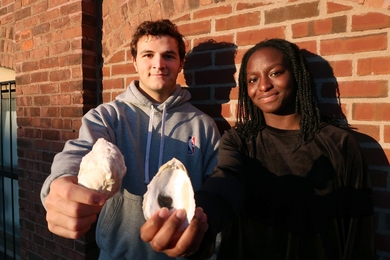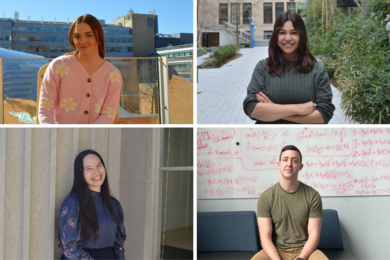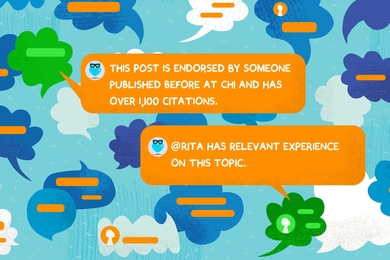In a bid to reverse new federal accounting rules that will likely mean a significant curtailment of undergraduate research programs at MIT and other universities, three UROP students traveled to Washington, DC to argue their case in person.
Raaj Chitaley, a junior in economics; Eileen Brooks, a senior in economics, and James McLurkin, a senior in electrical engineering, held a total of eight meetings (most of them one-on-one) with government officials on April 28 and 29. Among those who met with the students were Jill Blickstein, National Institutes of Health budget examiner; Rachel Levinson, assistant director of the Office of Science and Technology Policy; and Chuck Paoletti, director of the University Business Affairs in the Office of Naval Research.
Starting July 1, the government will no longer allow universities to waive fringe benefits and indirect costs of research associated with UROP stipends. This change will have the effect of nearly doubling the cost to faculty of hiring UROP students. MIT has allocated $1 million to make up the shortfall for this summer, but unless another government change is made or money from another source can be found, far fewer UROP positions will be available starting this fall.
The Washington officials were largely unaware of the size and extent of UROP at MIT, the students said. They explained that two-thirds of the faculty and 80 percent of undergraduates participate at some point, and that as much as half the student body does UROPs at any one time.
They also tried to give a clear idea of the importance of the program.
"Thousands of students are affected by this in a direct, bread-and-butter way," said Mr. Chitaley, who has done UROPs in mechanical engineering and economics in each of his four years at MIT. "It's not something that benefits just a small segment of the university. It benefits students regardless of race, grade point average, financial status or whatever."
Another point made by the trio was that the new rule "tries to create a dichotomy between research and education," said Ms. Brooks, who has done three UROP projects and who will be at Oxford University on a Rhodes scholarship next year. "It's really false to split the two ideas. There's some level at which research is a form of education."
By allowing the new rule to remain, Mr. Chitaley said, "you're really going to hurt a program that benefits everyone." He and the other students pointed out to the staffers that UROP results in both a better undergraduate education and savings to faculty members, for whom UROP labor is relatively inexpensive. The change "is really a lose-lose situation," he added. They further emphasized that the loss of the indirect-cost and benefits waiver would affect not just MIT but every research university that receives federal funds.
The fact that the officials were talking to students rather than lobbyists or other officials seemed to make a favorable impression. "We don't apply for federal grants. We're not the MIT administration-we're the people it affects," Mr. Chitaley noted.
A concrete example of a UROP project, in the form of a microrobot that Mr. McLurkin built, also brought the point home. His tabletop demonstration of the tiny autonomous machine that responds to light and reacts to collisions "softened up the crowd," he quipped.
While it is too early to say what further revisions, if any, will be made to the government accounting rules, "there are already indications that the students' visit did have an impact," said Toby Smith, a legislative assistant in MIT's Washington office who helped arrange the trip and accompanied the students.
"I thought they spoke really well for MIT's undergraduate experience. [Washington officials] don't get a chance to see students very often, especially those as impassioned as these were."
In addition to teaching about UROP, the students learned a few things about government workings. "It's very important that I as an engineer see the big picture, that I understand the whole system and how it all works," Mr. McLurkin said. "This made it real."
The trip to Washington was encouraged by the Working Group established by Provost Mark S. Wrighton to assist in addressing the budget problems for UROP and chaired by Professor James Elliot of earth, atmospheric and planetary sciences. The Provost's office provided resources to support the trip.
"Our students have learned first-hand about the importance of directly communicating their concerns regarding the strong synergy between education and research at MIT," Professor Wrighton said. "I am pleased with the progress made so far on this issue, but more effort lies ahead."
A version of this article appeared in the May 11, 1994 issue of MIT Tech Talk (Volume 38, Number 32).





